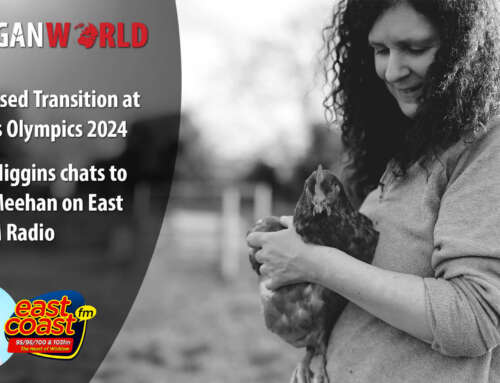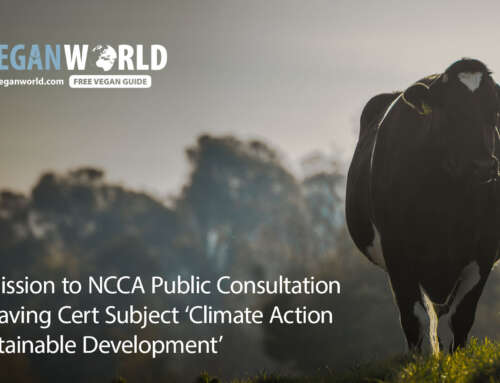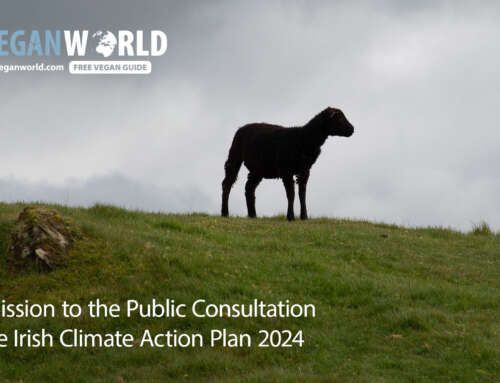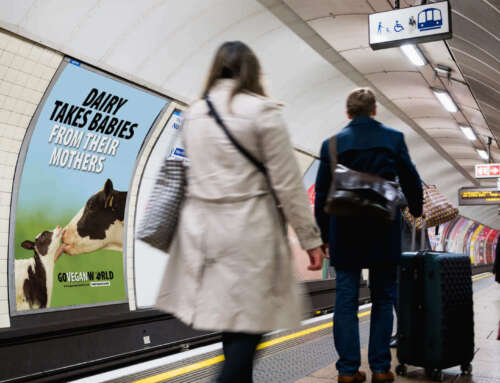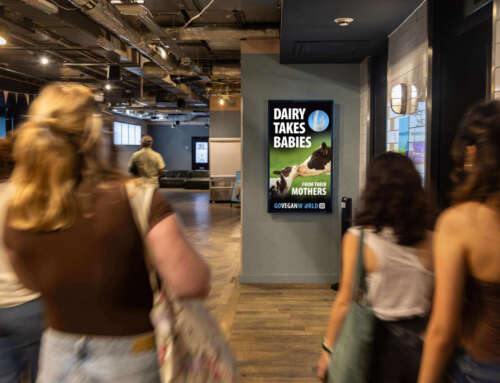Go Vegan World was invited onto BBC Radio Ulster’s Farming Matters programme to participate in a discussion about the growth of veganism, farming, climate change and the ethics of animal use.
Our Barbara Bolton spoke about the Go Vegan World educational campaign, which started in 2015 and which is currently running on buses in Northern Ireland, as well as other advertising formats across the UK and Ireland. Our campaign focuses on the sentience of other animals and the fact that humans should not use animals as resources or kill them.
During this interview, we pointed out that veganism dates back to the 30’s and 40’s in the UK, with the roots dating back much further than that, and it has always been about living with respect for others, humans and other non-human animals, considering the impact of our behaviour on other sentient beings, and on the environment. Right now, seeing the devastating impact of climate change, which humans have caused, it’s never been more important to recognise this true meaning of veganism.
We were asked if we demonise farmers, which gave us an opportunity to point out that everyone who is consuming animal products is culpable and we do not target farmers or anyone else involved in the animal-using industries. In fact, we want to work with farmers to help them transition away from using animals, to plant-based farming or an alternative use of the land which will be beneficial for us all. There are already examples of farmers who had been using animals and sending them to be killed, who realised it was wrong and so stopped, and this will become a more frequent occurrence. We need policy change to help farmers get out of animal use, and to support them in finding a viable alternative.
The representative from the National Sheep Association, which represents farmers in the UK who use sheep, suggested that we would not be able to produce enough food in the UK if we did not use and kill animals, because much of UK land is not suitable for growing crops. This is a common myth promoted by the animal-using industries. We pointed out that the study published by Harvard Law School last year showed that if we removed animals from the food-system we would free up over 50% of our cropland, which is currently used to grow food fed to animals. That cropland could be used instead to grow more food for humans. Northern Ireland has 530km2 of cropland, 58% of which is currently used to grow food fed to animals. By growing more of the fruit, vegetables, grains, pulses and nuts already grown in the UK and by adding other suitable varieties not currently grown in large quantities, we could meet the nutritional requirements of the whole population. In the UK we currently import over half of the food we consume, 90% of the fruit and vegetables, plus £2.2 billion of animal feed. By repurposing our cropland we could vastly reduce our food imports and become much more self-sufficient, possibly even completely self-sufficient in food production.
By removing animals from the food-system we would also free up the vast swathes of land currently used for grazing, on which we could reinstate native woodland. Expert reports are advising that if we are to have any hope of addressing human destruction of the environment and climate change we must reforest. In Northern Ireland 70% of the land is used for agriculture, 97% of which is for animal agriculture; by removing animals from the food system we free up huge areas of land for woodland. The Harvard report shows that if we reinstated woodland on land currently used for grazing in the UK the carbon capture would be highly significant and we would increase biodiversity and reinstate other animals’ habitats, as well as removing the greenhouse gas emissions caused by our use of other animals. Nearly 30% of greenhouse gases produced in Northern Ireland are from agriculture, compared to 10% in the rest of the UK, while forest cover is 40% lower than in the rest of the UK. The UK Committee on Climate Change has advised that agriculture must be a focus area for Northern Ireland in terms of playing its part in meeting reduction targets, and has recommended linking financial support to reduced emissions and increased carbon sequestration including through afforestation.
The representative of the National Sheep Association also suggested that if we were to stop using and killing animals for food we would be overrun with animals. That of course ignores the fact that we forcibly breed billions of animals into existence every year so that we can use and kill them. As more people go vegan the demand for animal products will drop and the animal-using industry will force fewer animals into existence and gradually the numbers will decrease. Eventually there will be very few of these species left, species we have created to produce more of what we want from them, and finally when consumption of animals stops altogether there will be some who will live out their lives in sanctuaries. Rescued animals are of course castrated/neutered to ensure that they don’t procreate.
Another common approach from the animal-using industries is to push vegans to confirm there is a way for vegans and farmers to get along while animals are still being used and killed. This is obviously an attempt to portray vegans as unreasonable and “extremist” and the animal-using industries as pragmatic and sensible. The way vegans and farmers can work together is through discussion about how we move forward to a plant food-system; if farmers and their representative bodies acknowledged that more and more people are realising that animal-use must stop and, instead of obstinately digging their heels in, participated in the discussion about the policy changes that are necessary to incentivise and support a transition to land use that is beneficial to all, that would give us something to work on together.
Resources:
https://www.theccc.org.uk/publication/reducing-emissions-in-northern-ireland/
https://ec.europa.eu/knowledge4policy/publication/summary-report-eat-lancet-commission_en

